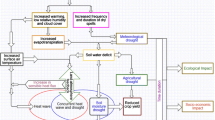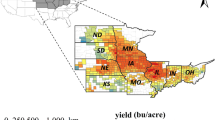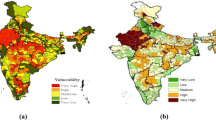Abstract
The paper evaluates varying trends in ten climate variables, i.e., maximum temperature (Tmx), mean temperature (Tmp), minimum temperature (Tmn), diurnal temperature range (Dtr), total precipitation (Pre), cloud cover (Cld), wet day frequency (Wet), vapor pressure deficit (Vpd), vapor pressure (Vap), and potential evapotranspiration (Pet), and their impacts on wheat yields during Rabi cropping season in India from 1986 to 2015 using regression modeling and correlation analysis. There are three aspects in the present study, i.e., comprehensive coverage of climate variables, use of cropping season over weather classification, and investigation of India as study area because India accounts for ~1/6th of the world population and ~14% of global wheat production. We find that Tmx, Tmp, Tmn, Vpd, Pet are increasing in eight and Dtr and Cld in seven Indian states, whereas Wet and Vap are decreasing in five and Pre in four Indian states. Most climate variables in the present study negatively impact wheat yields. The climate trends drive total wheat yield losses up to ~309 kg/ha (~11%) over the study period. The regression models explain up to ~80% of wheat yield variability. The paper provides strong evidence that varying climate trends are negatively impacting wheat yield in India, thus presenting a global concern. Water supply and water demand are important climate variables, essential to be investigated in future studies. Using cropping season over standard weather classification provides more practical insight in the crop yield. This study emphasizes timely attention and intervention in agriculture practices leading to policy formation, amendments and practical execution.












Similar content being viewed by others
References
Akter N, Islam MR (2017) Heat stress effects and management in wheat. Rev Agron Sustain Dev 37:37. https://doi.org/10.1007/s13593-017-0443-9
Arora M, Goel NK, Singh P (2005) Evaluation of temperature trends over India/Evaluation de tendances de température en Inde. Hydrol Sci J 50:81–93. https://doi.org/10.1623/hysj.50.1.81.56330
Asseng S, Foster I, Turner NC (2011) The impact of temperature variability on wheat yields. Glob Chang Biol 17:997–1012. https://doi.org/10.1111/j.1365-2486.2010.02262.x
Bapuji Rao B, Santhibhushan Chowdary P, Sandeep VM, Rao VUM, Venkateswarlu B (2014) Rising minimum temperature trends over India in recent decades: implications for agricultural production. Glob Planet Chang 117:1–8. https://doi.org/10.1016/J.GLOPLACHA.2014.03.001
Barkhordarian A, Saatchi SS, Behrangi A, Loikith PC, Mechoso CR (2019) A recent systematic increase in vapor pressure deficit over tropical South America. Sci Rep 9:15331. https://doi.org/10.1038/s41598-019-51857-8
Bekele F, Korecha D, Negatu L (2017) Demonstrating effect of rainfall characteristics on wheat yield: case of Sinana District, south eastern Ethiopia. Agric Sci 08:371–384. https://doi.org/10.4236/as.2017.85028
Bhatt D, Sonkar G, Mall RK (2019) Impact of climate variability on the rice yield in Uttar Pradesh: an agro-climatic zone based study. Environ Process 6:135–153. https://doi.org/10.1007/s40710-019-00360-3
Blyth EM, Torre AM, Robinson EL (2019) Trends in evapotranspiration and its drivers in Great Britain: 1961 to 2015. Prog Phys Geogr: Earth Environ 43(5):666–693. https://doi.org/10.1177/0309133319841891
Cai Y, Guan K, Lobell D, Potgieter AB, Wang S, Peng J, Xu T, Asseng S, Zhang Y, You L, Peng B (2019) Integrating satellite and climate data to predict wheat yield in Australia using machine learning approaches. Agric For Meteorol 274:144–159. https://doi.org/10.1016/j.agrformet.2019.03.010
Caverzan A, Casassola A, Brammer SA (2016) Antioxidant responses of wheat plants under stress. Genet Mol Biol 39:1–6. https://doi.org/10.1590/1678-4685-GMB-2015-0109
Chakraborty D, Saha S, Singh RK, Sethy BK, Kumar A, Saikia US, Das SK, Makdoh B, Borah TR, Chanu AN, Walling I, Anal PSR, Chowdhury S, Daschaudhuri D (2017) Trend analysis and change point detection of mean air temperature: a spatio-temporal perspective of north-eastern India. Environ Process 4:937–957. https://doi.org/10.1007/s40710-017-0263-6
Dahal V, Gautam S, Bhattarai R (2018) Analysis of long-term temperature trend in Illinois and its implication on the cropping system. Environ Process 5:451–464. https://doi.org/10.1007/s40710-018-0306-7
Das PK, Chakraborty A, Seshasai MVR (2014) Spatial analysis of temporal trend of rainfall and rainy days during the Indian summer monsoon season using daily gridded (0.5° × 0.5°) rainfall data for the period of 1971–2005. Meteorol Appl 21:481–493. https://doi.org/10.1002/met.1361
Duncan JMA, Saikia SD, Gupta N, Biggs EM (2016) Observing climate impacts on tea yield in Assam, India. Appl Geogr 77:64–71. https://doi.org/10.1016/j.apgeog.2016.10.004
Fakhet D, Morales F, Jauregu I, Erice G, Aparicio-Tejo PM, González-Murua C, Aroca R, Irigoyen JJ, Aranjuelo I (2021) Short-term exposure to high atmospheric vapor pressure deficit (VPD) severely impacts durum wheat carbon and nitrogen metabolism in the absence of edaphic water stress. Plants 10:120. https://doi.org/10.3390/plants10010120
FAOSTAT (2019). FAOSTAT Agricultural data, 2019 http://wwwfaoorg/faostat/en/. Accessed 2 Dec 2019
Farooq M, Wahid A, Kobayashi N, Fujita D, Basra SMA (2009) Plant drought stress: effects, mechanisms and management. Agron Sustain Dev 29:185–212. https://doi.org/10.1051/agro:2008021
Feng B, Liu P, Li G, Dong ST, Wang FH, Kong LA, Zhang JW (2014) Effect of heat stress on the photosynthetic characteristics in flag leaves at the grain-filling stage of different heat-resistant winter wheat varieties. J Agron Crop Sci 200:143–155. https://doi.org/10.1111/jac.12045
Grossiord C, Buckley TN, Cernusak LA, Novick KA, Poulter B, Siegwolf RTW, Sperry JS, McDowell NG (2020) Plant responses to rising vapor pressure deficit. New Phytol 226(6):1550–1566. https://doi.org/10.1111/nph.16485
Harris I, Osborn TJ, Jones P, Lister D (2020) Version 4 of the CRU TS monthly high-resolution gridded multivariate climate dataset. Sci Data 7:109. https://doi.org/10.1038/s41597-020-0453-3
Hochman Z, Gobbett DL, Horan H (2017) Climate trends account for stalled wheat yields in Australia since 1990. Glob Chang Biol 23:2071–2081. https://doi.org/10.1111/gcb.13604
Hong C, Zhang Q, Zhang Y, Davis SJ, Tong D, Zheng Y, Liu Z, Guan D, He K, Schellnhuber HJ (2019) Impacts of climate change on future air quality and human health in China. Proc Natl Acad Sci 116(35):17193–17200. https://doi.org/10.1073/pnas.1812881116
IPCC-AR4 (2007) IPCC-AR4, 2007, climate change 2007, the scientific basis, contribution of working group-I to the fourth assessment report of intergovernmental panel on climate change (IPCC). Cambridge University Press, Cambridge
IPCC-AR5 (2014) IPCC-AR5, 2014, climate change 2014, the scientific basis, contribution of working group-I to the fourth assessment report of intergovernmental panel on climate change (IPCC). Cambridge University Press, Cambridge
Jaswal AK, Kore PA, Singh V (2016) Trends in diurnal temperature range over India (1961–2010) and their relationship with low cloud cover and rainy days. J Clim Chang 2:35–55. https://doi.org/10.3233/jcc-160016
Kirkegaard JA, Lilley JM, Howe GN, Graham JM (2007) Impact of subsoil water use on wheat yield. Aust J Agric Res 58:303. https://doi.org/10.1071/ar06285
Kumar V, Jain SK (2011) Trends in rainfall amount and number of rainy days in river basins of India (1951–2004). Hydrol Res 42(4):290–306. https://doi.org/10.2166/nh.2011.067
Liu D, Mishra AK, Ray DK (2020) Sensitivity of global major crop yields to climate variables: a non-parametric elasticity analysis. Sci Total Environ 748:141431. https://doi.org/10.1016/j.scitotenv.2020.141431
Lobell DB, Burke MB (2010) On the use of statistical models to predict crop yield responses to climate change. Agric For Meteorol 150:1443–1452. https://doi.org/10.1016/j.agrformet.2010.07.008
Lobell DB, Schlenker W, Costa-Roberts J (2011) Climate trends and global crop production since 1980. Science 333:616–620. https://doi.org/10.1126/science.1204531
Lobell DB, Sibley A, Ivan Ortiz-Monasterio J (2012) Extreme heat effects on wheat senescence in India. Nat Clim Chang 2:186–189. https://doi.org/10.1038/nclimate1356
López J, Way DA, Sadok W (2021) Systemic effects of rising atmospheric vapor pressure deficit on plant physiology and productivity. Glob Chang Biol 27(9):1704–1720. https://doi.org/10.1111/gcb.15548
Madhukar A, Kumar V, Dashora K (2020) Spatial and temporal trends in the yields of three major crops: wheat, rice and maize in India. Int J Plant Prod 14:187–207. https://doi.org/10.1007/s42106-019-00078-0
Madhukar A, Dashora K, Kumar V (2021a) Spatial analysis of yield trends and impact of temperature for wheat crop across Indian districts. Int J Plant Prod 15:325–335. https://doi.org/10.1007/s42106-021-00140-w
Madhukar A, Dashora K, Kumar V (2021b) Investigating historical climatic impacts on wheat yield in India using a statistical modeling approach. Model Earth Syst Environ 7:1019–1027. https://doi.org/10.1007/s40808-020-00932-5
Nair MR, Nayak S (2017) Observed climate variability and change over the Indian region. Springer, Singapore
Niwas R, Khichar ML (2016) Managing impact of climatic vagaries on the productivity of wheat and mustard in India. Mausam 67:205–222
Nunez S, Arets E, Alkemade R, Verwer C, Leemans R (2019) Assessing the impacts of climate change on biodiversity: is below 2 °C enough? Clim Chang 154:351–365. https://doi.org/10.1007/s10584-019-02420-x
Pachauri RK, Allen MR, Barros VR, Broome J, Cramer W, Christ R, Church JA, Clarke L, Dahe Q, Dasgupta P, Dubash NK, Edenhofer O, Elgizouli I, Field CB, Forster P, Friedlingstein P, Fuglestvedt J, Gomez-Echeverri L, Hallegatte S, Hegerl G, Howden M, Jiang K, Jimenez Cisneroz B, Kattsov V, Lee H, Mach KJ, Marotzke J, Mastrandrea MD, Meyer L, Minx J, Mulugetta Y, O'Brien K, Oppenheimer M, Pereira JJ, Pichs-Madruga R, Plattner GK, Pörtner HO, Power SB, Preston B, Ravindranath NH, Reisinger A, Riahi K, Rusticucci M, Scholes R, Seyboth K, Sokona Y, Stavins R, Stocker TF, Tschakert P, van Vuuren D, van Ypserle JP (2014) Climate change 2014: synthesis report. Contribution of working groups I, II and III to the fifth assessment report of the intergovernmental panel on climate change (IPCC 2014). 10013/epic.45156
Pendergrass AG, Hartmann DL (2014) Changes in the distribution of rain frequency and intensity in response to global warming. J Clim 27:8372–8383. https://doi.org/10.1175/JCLI-D-14-00183.1
Praveen B, Talukdar S, Shahfahad MS, Mondal J, Sharma P, Islam ARMT, Rahman A (2020) Analyzing trend and forecasting of rainfall changes in India using non-parametrical and machine learning approaches. Sci Rep 10:10342. https://doi.org/10.1038/s41598-020-67228-7
Putnam AE, Broecker WS (2017) Human-induced changes in the distribution of rainfall. Sci Adv 3(5):e1600871. https://doi.org/10.1126/sciadv.1600871
Qin J, Su B, Tao H, Wang Y, Huang J, Li Z, Jiang T (2021) Spatio-temporal variations of dryness/wetness over Northwest China under different SSPs-RCPs. Atmos Res 259:105672. https://doi.org/10.1016/j.atmosres.2021.105672
R Development Core Team (2018) R: a language and environment for statistical computing. R Foundation for Statistical Computing, Vienna URL http://www.R-project.org/. https://www.r-project.org/. Accessed 20 May 2021
Rao BB, Chowdary PS, Sandeep VM, Pramod VP, Rao VUM (2015) Spatial analysis of the sensitivity of wheat yields to temperature in India. Agric For Meteorol 200:192–202. https://doi.org/10.1016/j.agrformet.2014.09.023
Ray DK, Gerber JS, Macdonald GK, West PC (2015) Climate variation explains a third of global crop yield variability. Nat Commun 6:1–9. https://doi.org/10.1038/ncomms6989
Ray DK, West PC, Clark M, Gerber JS, Prishchepov AV, Chatterjee S (2019) Climate change has likely already affected global food production. PLoS One 14:e0217148. https://doi.org/10.1371/journal.pone.0217148
Ross RS, Krishnamurti TN, Pattnaik S, Pai DS (2018) Decadal surface temperature trends in India based on a new high-resolution data set. Sci Rep 8:7452. https://doi.org/10.1038/s41598-018-25347-2
Schewe J, Heinke J, Gerten D, Haddeland I, Arnell NW, Clark DB, Dankers R, Eisner S, Fekete BM, Colón-González FJ, Gosling SN, Kim H, Liu X, Masaki Y, Portmann FT, Satoh Y, Stacke T, Tang Q, Wada Y, Wisser D, Albrecht T, Frieler K, Piontek F, Warszawski L, Kabat P (2014) Multimodel assessment of water scarcity under climate change. Proc Natl Acad Sci 111(9):3245–3250. https://doi.org/10.1073/pnas.1222460110
Shah NH, Paulsen GM (2003) Interaction of drought and high temperature on photosynthesis and grain-filling of wheat. Plant Soil 257:219–226. https://doi.org/10.1023/A:1026237816578
Sloat LL, Davis SJ, Gerber JS, Moore FC, Ray DK, West PC, Mueller ND (2020) Climate adaptation by crop migration. Nat Commun 11:1243. https://doi.org/10.1038/s41467-020-15076-4
Sonkar G, Mall RK, Banerjee T, Singh N, Kumar TVL, Chand R (2019) Vulnerability of Indian wheat against rising temperature and aerosols. Environ Pollut 254:112946. https://doi.org/10.1016/j.envpol.2019.07.114
Syed TH, Famiglietti JS, Chambers DP, Willis JK, Hilburn K (2010) Satellite-based global-ocean mass balance estimates of interannual variability and emerging trends in continental freshwater discharge. Proc Natl Acad Sci 107(42):17916–17921. https://doi.org/10.1073/pnas.1003292107
Tafoughalti K, el Faleh EM, Moujahid Y, Ouargaga F (2018) Climate change impact on rainfall: how will threaten wheat yield? E3S Web Conf 37:03001. https://doi.org/10.1051/e3sconf/20183703001
Tanaka A, Takahashi K, Masutomi Y, Hanasaki N, Hijioka Y, Shiogama H, Yamanaka Y (2015) Adaptation pathways of global wheat production: importance of strategic adaptation to climate change. Sci Rep 5:14312. https://doi.org/10.1038/srep14312
Tao F, Xiao D, Zhang S, Zhang Z, Rötter RP (2017) Wheat yield benefited from increases in minimum temperature in the Huang-Huai-Hai Plain of China in the past three decades. Agric For Meteorol 239:1–14. https://doi.org/10.1016/j.agrformet.2017.02.033
Vinnarasi R, Dhanya CT, Chakravorty A, Aghakouchak A (2017) Unravelling diurnal asymmetry of surface temperature in different climate zones. Sci Rep 7:7350. https://doi.org/10.1038/s41598-017-07627-5
Vose RS, Easterling DR, Gleason B (2005) Maximum and minimum temperature trends for the globe: an update through 2004. Geophys Res Lett 32:1–5. https://doi.org/10.1029/2005GL024379
Will RE, Wilson SM, Zou CB, Hennessey TC (2013) Increased vapor pressure deficit due to higher temperature leads to greater transpiration and faster mortality during drought for tree seedlings common to the forest–grassland ecotone. New Phytol 200:366–374. https://doi.org/10.1111/nph.12321
Ye J, Gao Z, Wu X, Lu Z, Li C, Wang X, Chen L, Cui G, Yu M, Yan G, Liu H, Zhang H, Wang Z, Shi X, Li Y (2021) Impact of increased temperature on spring wheat yield in northern China. Food Energy Secur 10(2):368–378. https://doi.org/10.1002/fes3.283
Yuan W, Zheng Y, Piao S, Ciais P, Lombardozzi D, Wang Y, Ryu Y, Chen G, Dong W, Hu Z, Jain AK, Jiang C, Kato E, Li S, Lienert S, Liu S, Nabel JEMS, Qin Z, Quine T, Sitch S, Smith WK, Wang F, Wu C, Xiao Z, Yang S (2019) Increased atmospheric vapor pressure deficit reduces global vegetation growth. Sci Adv 5:8. https://doi.org/10.1126/sciadv.aax1396
Zaveri E, Lobell DB (2019) The role of irrigation in changing wheat yields and heat sensitivity in India. Nat Commun 10:4144. https://doi.org/10.1038/s41467-019-12183-9
Zhang S, Tao F, Zhang Z (2017) Spatial and temporal changes in vapor pressure deficit and their impacts on crop yields in China during 1980–2008. J Meteorol Res 31:800–808. https://doi.org/10.1007/s13351-017-6137-z
Acknowledgments
Anand Madhukar sincerely thank the Indian Institute of Technology Delhi (IIT Delhi) India for providing a research fellowship. Authors declare no conflict of interest or finance.
Funding
Anand Madhukar sincerely thank the Indian Institute of Technology Delhi (IIT Delhi) India for providing a research fellowship.
Author information
Authors and Affiliations
Contributions
Conceptualization, Methodology, Software, Formal analysis and investigation, Data Curation, Writing – Original draft preparation, Writing – review & editing, Visualization: Anand Madhukar; Supervision, Funding acquisition: Kavya Dashora; Validation, Supervision, Funding acquisition: Vivek Kumar.
Corresponding author
Ethics declarations
Data Availability
The authors declare that data supporting the findings of this study are available and were cited within the article.
Conflicts of Interest/Competing Interests
Authors declare that they have no conflict of interest or finance.
Additional information
Publisher’s Note
Springer Nature remains neutral with regard to jurisdictional claims in published maps and institutional affiliations.
Highlights
• Climate trends in temperature and water variables are investigated.
• Climate trends vary per variable per region.
• Wheat is negatively sensitive to varying climate trends.
• Total wheat yield losses are up to ~309 kg/ha (~11%) during 1986–2015.
• Regression models explain up to ~80% of year-to-year variability in wheat yields.
Supplementary Information
ESM 1
(DOCX 938 kb)
Rights and permissions
About this article
Cite this article
Madhukar, A., Dashora, K. & Kumar, V. Climate Trends in Temperature and Water Variables during Wheat Growing Season and Impact on Yield. Environ. Process. 8, 1047–1072 (2021). https://doi.org/10.1007/s40710-021-00526-y
Received:
Accepted:
Published:
Issue Date:
DOI: https://doi.org/10.1007/s40710-021-00526-y




